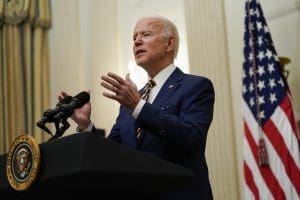Biden reverses Trump's bigoted military ban: 'All Americans who are qualified' can serve
President Joe Biden fulfills one of his key campaign promises.

Less than a week after he was sworn into office, President Joe Biden moved to reverse the Trump administration’s policy that banned transgender people from openly serving in the military.
A fact sheet issued on Jan. 25 by the White House notes, “President Biden signed today an Executive Order that sets the policy that all Americans who are qualified to serve in the Armed Forces of the United States should be able to serve. The All-Volunteer Force thrives when it is composed of diverse Americans who can meet the rigorous standards for military service, and an inclusive military strengthens our national security.”
In the executive order, Biden directs the secretary of defense and secretary of homeland security to take steps to reverse the policy and asks for a report within 60 days on their progress in implementing the order. It also “immediately prohibits involuntary separations, discharges, and denials of reenlistment or continuation of service on the basis of gender identity or under circumstances relating to gender identity.”
LGBTQ organizations celebrated the decision.
Jennifer Levi, the director of transgender rights project at GLBTQ Legal Advocates & Defenders, stated, “Our fight to end the transgender military ban was about equal opportunity, fairness and service, and President Biden’s order today honors those shared national values.”
“This is a great day for our nation and a welcome relief from the negative and divisive policies of the past four years,” stated Shannon Minter, legal director of the National Center for Lesbian Rights.
Biden told the Dallas Voice last year, “On day one of my presidency, I will direct the Department of Defense to allow transgender service members to serve openly and free from discrimination. I know that this is not just the right thing to do, but it’s in our national interest.”
The order comes just a few days after Biden signed an executive order telling agencies to enforce laws prohibiting sex discrimination in line with the Supreme Court’s decision in Bostock v. Clayton County that discrimination against LGBTQ workers can be defined as discrimination on the basis of sex.
Gen. Lloyd Austin, nominated by Biden to serve as secretary of defense, said on Tuesday that he supports rescinding the ban. He told the Senate Armed Services Committee during his confirmation hearing, “I truly believe that if you’re a fit and you’re qualified to serve and you can maintain the standards, you should be allowed to serve.”
The efforts to enact a transgender military ban began with Donald Trump tweeting on July 26, 2017, “After consultation with my Generals and military experts, please be advised that the United States Government will not accept or allow Transgender individuals to serve in any capacity in the U.S. Military. Our military must be focused on decisive and overwhelming victory and cannot be burdened with the tremendous medical costs and disruption that transgender in the military would entail.”
The tweets were posted while the secretary of defense at the time, Jim Mattis, was on vacation, and after efforts by Republican Rep. Vicky Hartzler of Missouri to get an amendment to the National Defense Authorization Act through Congress to stop service members and their families from having their transition-related care paid for by the military. That measure was defeated in the House.
In response to Trump’s tweets, Hartzler said she was “pleased to hear” that Trump supported her concerns and called the inclusion of transgender service members “a costly and damaging policy.”
Previously, in June 2016, President Barack Obama’s Secretary of Defense Ash Carter had lifted the existing ban on transgender people serving openly and said that by October of that year, transgender service members should be able to receive transition-related care from the military.
From August to September 2017, the National Center for Lesbian Rights, GLBTQ Legal Advocates & Defenders, the ACLU, and Equality California all filed lawsuits challenging the Trump administration’s policy. After a long legal battle, in January 2019, the Supreme Court voted 5-4 to allow it to go into effect, which it did on April 12 of that year.
The Trump administration responded cagily to questions about the policy. After Trump tweeted about the ban in 2017, ABC News reporter Arlette Saenz asked him when he had made the decision. He dismissed her, saying, “She’s very rude.”
In July of last year, Washington Blade journalist Chris Johnson asked White House press secretary Kayleigh McEnany whether the president would reconsider the ban after 116 lawmakers sent a letter to Defense Secretary Mark Esper and Attorney General William Barr urging them to get rid of it. McEnany evaded the question and said Trump has a “great record when it comes to the LGBTQ community.”
The ban has already done damage to the military, according to a study released in November 2020 by the Palm Center, a research institute focused on gender and sexuality. Researchers found the policy has hurt recruitment, unit cohesion, medical care, reputation, and good order and discipline. It makes it difficult for transgender service members to frankly discuss medical care with their doctors and damages trust among service members because some of them are forced to keep their transgender status a secret.
In a memo issued in July, the Palm Center stated, “A return to inclusive policy could take place without delay, and certainly within 30 days, because current military regulations have preserved the full catalog of inclusive policy measures developed under the Obama administration … The Department of Defense left all the necessary breadcrumbs to mark the way back to inclusive service.”
The Modern Military Association of America, Human Rights Campaign, the Center for American Progress, and a number of other organizations noted their concurrence with the Palm Center’s statements.
Published with permission of The American Independent Foundation.
Recommended

Alaska House committee advances, expands proposal to bar trans girls from girls sports
Amended bill would add elementary, middle school and collegiate sports to limits in place for high school
By Claire Stremple, Alaska Beacon - April 16, 2024
Bills targeting trans people are on the rise nationwide and in Alaska — most focus on children
House committee advances legislation that would restrict the rights of Alaska trans kids
By Claire Stremple, Alaska Beacon - April 01, 2024
Anti-abortion, anti-LGBTQ resolutions to be voted on at state Republican convention
A resolution to be considered by North Dakota Republican Party delegates at their upcoming convention would define life as beginning at fertilization and call for criminal penalties for “anyone who kills a pre-born human being.”
By Michael Achterling, North Dakota Monitor - March 26, 2024









































































